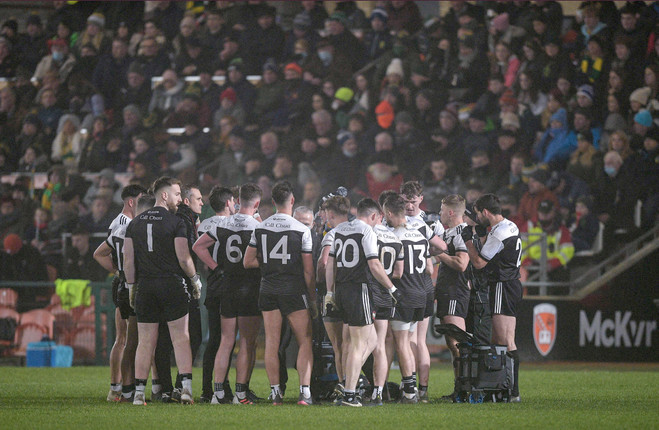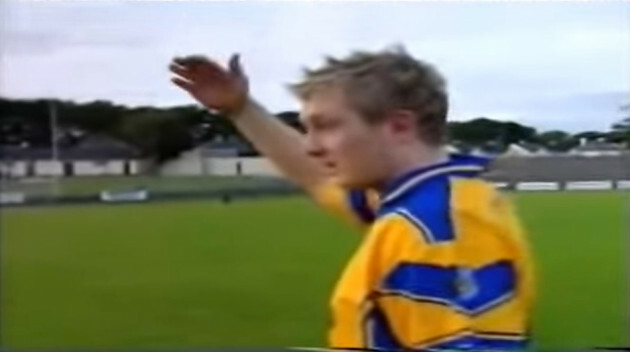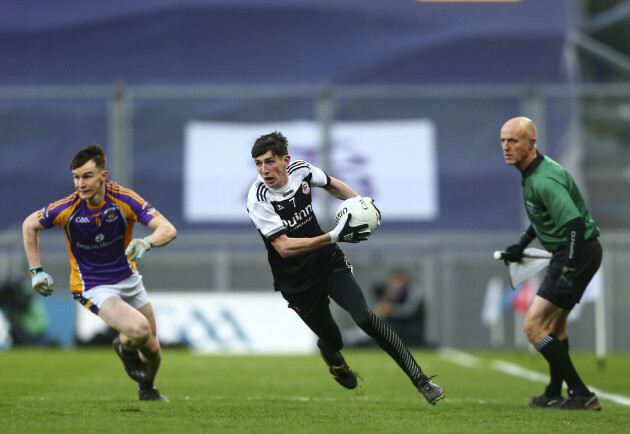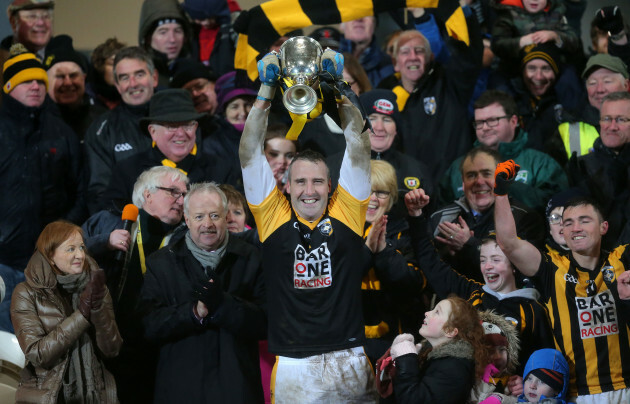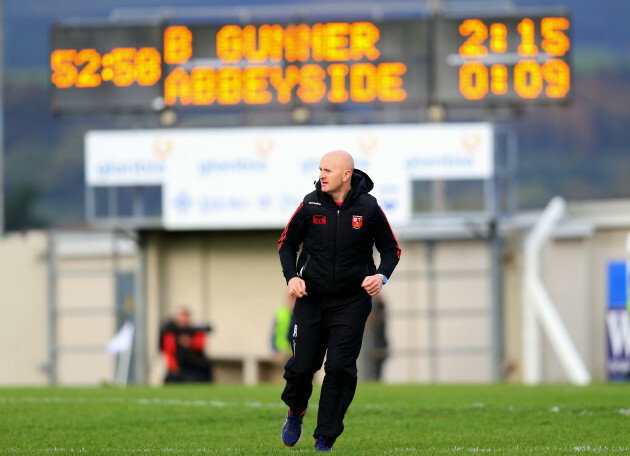THE GOLDEN CHILD in a golden age. Joe Canning and Portumna were reaching dizzying heights year on year. The club contested seven consecutive county finals between 2003 and 2009. All-Irelands in 2006, 2008 and 2009. Another in 2014 for good measure.
But on this day, he was beyond enraged. They had won another local derby and it mattered little. His voice charged with emotion, he strolled off the field and let loose.
“I should be over the moon because we won the game… but it’s a load of bull,” he told RTE’s Pride of the Parish in 2009. “We’re there to be beaten, we’re up on the highest tier. And we’re there to be knocked off it. We have to expect that. But there is a line. You need fair play like. Do you know what I mean?
“It’s just a thing that we can’t take it every day we go out. We’ll be retired by the time we’re 27 or 28 with broken legs and broken fingers and nothing said about it, y’know?”
That rural parish’s monumental climb was driven by priceless inseparability. A brotherhood. Four in particular. Cannings. Lynchs. Hayes’. Smiths. The group cherished club hurling. Careers and relationships orientated around that core purpose. This is the typical tale of a successful tight club. A small circle, one big family.
They were fuelled by pride and a need to prove people wrong.
“We absolutely have a point to prove,” explained Leo Smith in the same documentary. “We really do. I think each and every one of us here, we want to show everyone. In Galway more than in Ireland.”
“There are a lot of people within the county that don’t rate us because we didn’t put back-to-back titles like Sarsfields or Athenry, great teams that went before us,” agreed Ollie Canning. “Time will tell if we have the hunger to do it.”
Just a handful of that team represented their county. Notably, both Cannings did not play for Galway in the aftermath of the 2006 county final. Joe required stitches to his face following an incident during the first half of a heated clash with Loughrea. The fall-out could have been catastrophic. Canning nearly quit the sport.
Eventually, Canning did enter the fold and duly delivered spectacular showings. When Galway’s going was poor, the constant theory was that the club rivalry was a source of underlying tension. Canning always dismissed such ideal talk. It wasn’t a factor in their profitable years of 2012 and 2017, nor was it the reason behind disappointments like 2013 and 2019.
Club rivalries spilling into the county scene is nothing new, even if Eugene Branagan was speaking as someone who never actually took the step. The club footballer of the year has never represented Down, although that did not stop him from taking aim last week. He hails from Kilcoo, a small club in the shadow of the Mourne Mountains.
Eight brothers’ backbone that outfit. Five Branagans and three Johnstons, their cousins. Eugune’s barb stems from richer soil. Cantankerous to their roots.
The reality is that the 25-year-old merely said the quiet part out loud. It was a small insight into a collective mentality. Clubs have often exploited it. After their All-Ireland win, captain Conor Laverty suggested in interviews the goal was to prove the doubters wrong.
Since 2009 they have amassed ten county championships. That was always going to breed an element of wider envy, and a welcomed chance to respond to it.
“Look, the reality is many use that sort of thing,” says former Armagh goalkeeper and Crossmaglen’s Paul Hearty. They have claimed 10 of the last 15 championships along with two All-Irelands and four Ulster titles.
“The whole world is against us. Us vs them. A lot of teams tap into that siege mentality. It is about the group, the village.
“He has that mentality; he is probably a bit silly to say it. I’ve been involved in teams that use that. Put it up on the wall or use it for an edge. But you would never say it in an interview.”
There was a time some sideline critics felt the Crossmaglen clubmen put club before county or that it influenced decisions. Various flashpoints stoked debate. Joe Kernan’s bold call to take off Kieran McGeeney during the 2005 semi-final loss against Tyrone. Paul Hughes, Kyle Carragher and Jamie Clarke leaving the panel in 2016.
Kernan maintained he made the call in consultation with his selectors and Clarke clarified there was no disaccord, just a desire to travel. For Hearty, such clamour was only ever white noise. Within the camp, that gossip was dismissed.
“Every time it was the same mindset. It is about inside the dressing room. That one team. If you are in there it is a bubble. Those four walls and let nothing penetrate.”
Gradually parochial resentment diminishes thanks to prolonged exposure. The rising time required to be an intercounty player means more time in each other’s company. In Crossmaglen it was like a switch. With the county, they were there to mount a collective challenge. With the club, they were there to be challenged. Everyone wants to beat the best. The best should relish that.
“Why else would you be playing football? I remember when we played St. Galls after they won the Ulster in 09. We wanted to beat the best and beat the shite out of them. When you are the champions, everyone wants to knock you off your perch. That is par for the course.”
Increasingly, triumphant clubs do not transfer wholesale to the county. The physical demands of the inter-county game are rapidly outstripping the level required to play club. Thanks to development squads there is now early identification long before senior exposure. Presenting in Sigerson and Fitzgibbon setups is also more comparable to the main event.
Look across the country and the proof is in the teamsheets. Against Kilkenny, Galway had three players from four-in-row winners St Thomas’. Even in their pomp Galway’s footballers rarely called on a large Corofin contingent. The same is true of previous dominant outfits like St Vincents in Dublin or Dr Crokes in Kerry.
All-Ireland hurling champions Ballygunner look eternal champions in their county. Eight in a row and counting. They consistently produce Déise greats. One of them is Fergal Hartley, who enjoyed a lengthy playing career with both and later managed his club.
Their triumphs are constant, but one thing has changed.
“Ballgunner won three in a row in my time in the 90s. We’d six starters in Championship. There was a time once when Ballygunner would make up 10 of the starting 15. You rarely see that sort of thing across the country. Nowadays if you see two from the same club, it is because they are brothers!
“We’ve one player starting for Waterford, the least in 30 years and we are All-Ireland champions. There is an irony in that to some extent but it is a reflection of the time.
“Back in the day, county success would backbone a county team. At least four or five from the county champions. If you played in the final you were in the shop window. That was in the day managers didn’t go to every game and cast the net. The notion that a player is being overlooked now doesn’t stack up.”
The problem is never really club rivalry. More club loyalty. As soon as a group take the first step and buy-in, barriers break down. The whole is greater than the sum of the parts.
“It is inevitable given the amount of time you spend together,” stress Hartley.
“Ballgunner’s success has to be a good thing for Waterford hurling. Driving standards. What it does for expectation and confidence. Even back when I played in 2005 and before that, all clubs when they came to county wore the Waterford jersey, not their club one.
“You have to go back to the previous era when lads didn’t spend time together. Lads trained and drank with their clubs. The club came first. County came second. Those days are gone.”
Almost everywhere.
